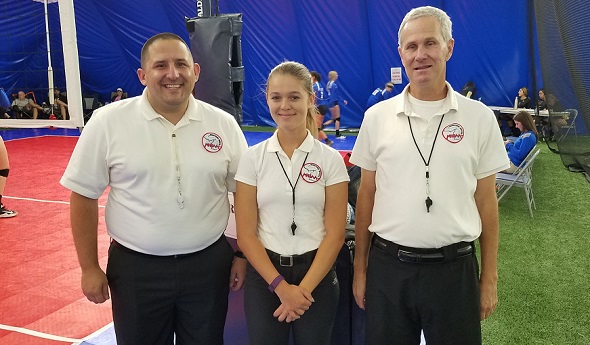
Be the Referee: Wrestling Health Concern
January 28, 2015
This week, MHSAA assistant director Mark Uyl addresses health concerns in wrestling with a focus on prevention.
Be The Referee is a series of short messages designed to help educate people on the rules of different sports, to help them better understand the art of officiating, and to recruit officials.
Below is this week's segment - Wrestling Health Concerns - Listen
It’s often been said that the toughest six minutes in all of sports can be found on a wrestling mat. The sport of high school wrestling can be one of the most physically and mentally challenging endeavors that a young person can ever experience.
However, the rewards that kids can find through the sport of wrestling can be some of the most rewarding experiences that someone can find anywhere. The biggest challenge right now in keeping wrestling strong and growing is the prevention of communicable disease.
Staph infections such as MRSA are one of the key threats right now to wrestling, and schools, wrestlers and officials need to be diligent daily in keeping mats clean and using good hygiene habits to prevent the spread of these skin-to-skin conditions.
Past editions
Jan. 19 - Basketball Physical Contact - Listen
Jan. 12 - Video Review Part 2 - Listen
Dec. 29 - Video Review Part 1 - Listen
Dec. 17 - Registration Part 2 - Listen
Dec. 10 - Registration Part 1 - Listen
Dec. 3 - Legacy Program - Listen
Nov. 26 - Sideline Management - Listen
Nov. 19 - 7-Person Mechanics - Listen
Nov. 12 - Blocking Below the Waist - Listen
Nov. 5 - Tournament Selection - Listen
Oct. 29 - Uncatchable Pass - Listen
Oct. 22 - Preparation for Officials - Listen
Oct. 15 - Automatic First Downs - Listen
Oct. 8 - Officials & Injuries - Listen
Oct. 1 - Overtime - Listen
Sept. 25 - Field Goals - Listen
Sept. 18 - Tackle Box - Listen
Sept. 11 - Pass Interference - Listen
Aug. 25 - Targeting - Listen

The Official View: Multiplying Legacies
By
Brent Rice
MHSAA Assistant Director
September 17, 2018
By Brent Rice
MHSAA Assistant Director
In this week’s edition, check out the latest news on the MHSAA’s Officials Review Committee and Officials Guidebook, rules scenarios to consider in football and swimming and a quick story of multiple generations learning through the Legacy Program.
It’s Official!
Officials Review Committee Meeting: The Officials Review Committee will meet next week, and the agenda will include a number of important topics such as officials’ tournament fees, registration options and benefits, and the current system of selecting tournament officials.
The Officials Guidebook will be released in the upcoming week. Whether you’re an official, assigner, or association leader, please take some time to review its policies, requirements, and restrictions. It should have much of the information you need regarding the administrative duties of MHSAA officiating.
Rule of the Week
FOOTBALL Late in a tight contest, A1 receives the snap and attempts to throw a bubble screen to a stacked receiver behind A1’s position. As A1’s arm motion begins forward in his attempt to make the backward pass, it is contacted by rushing B1 and is knocked loose. Team B falls on top of the ball.
Ruling: This is a turnover and Team B’s ball. Even though the arm motion is coming forward, this is not a legal forward pass because it is not in the direction of the line of scrimmage. As a result, this is a fumble and live ball until it is recovered by Team B.
It’s Your Call
SWIMMING This week’s clip involves determining the legality of a turn in swim. The swimmer is participating in a 100-yard backstroke race. This clip begins at the point where he is beginning his turn. Is this a legal turn in this backstroke event? Why or why not? Check back next week for the correct ruling. (Video courtesy of USA Swimming.)
Official View
In 1996, Dana Fuller (far left in top photo) was a Legacy official under the tutelage of mentor official Jerry Sosnowski (far right). Things came full circle at a recent volleyball contest while working with his new Legacy mentee, Olivia Kostiz, when all three generations of the Legacy program were able to work together.

